Over 30 years of anarchist writing from Ireland listed under hundreds of topics
Review
The Networked Individual in Why its Kicking Off Everywhere - audio of discussion on Paul Mason's book
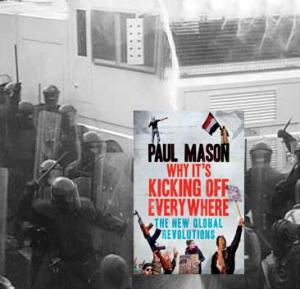 Andrew Flood looks at Paul Mason's recently published book 'Why its kicking off everywhere' and in particular what Mason has to say about the internet and the emergance of the 'Networked Individual'. The recording is of a WSM supporters meeting in Dublin and the 20 minute presentation is followed by 30 minutes of discussion on the ideas outlined, roughly as summarised below.
Andrew Flood looks at Paul Mason's recently published book 'Why its kicking off everywhere' and in particular what Mason has to say about the internet and the emergance of the 'Networked Individual'. The recording is of a WSM supporters meeting in Dublin and the 20 minute presentation is followed by 30 minutes of discussion on the ideas outlined, roughly as summarised below.
The talk was part of the preparation for an 18,000 word review & discussion of 'Why its kicking off everywhere'.
Bernadette: One women's journey from mass protest to hunger strikes to the peace process
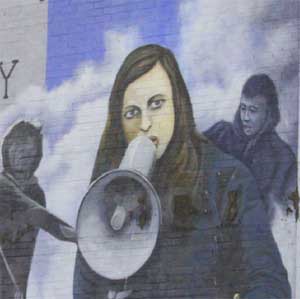 The end of the 1960’s in northern Ireland were a unique time when, as elsewhere around the world, mass popular protest emerged onto the streets with ordinary people doing extraordinary things. The unique circumstances of northern Ireland and the particular form the state backlash took there resulted in a military conflict that lasted some 30 years and dominated politics on the entire island and to a much lesser extent in Britain. Although tens if not hundreds of thousands of people made this history it can also be told as the history of some of the prominent individuals involved, including the Irish republican socialist activist Bernadette Devlin McAliskey.
The end of the 1960’s in northern Ireland were a unique time when, as elsewhere around the world, mass popular protest emerged onto the streets with ordinary people doing extraordinary things. The unique circumstances of northern Ireland and the particular form the state backlash took there resulted in a military conflict that lasted some 30 years and dominated politics on the entire island and to a much lesser extent in Britain. Although tens if not hundreds of thousands of people made this history it can also be told as the history of some of the prominent individuals involved, including the Irish republican socialist activist Bernadette Devlin McAliskey.
Review: A Wee Black Booke of Belfast Anarchism
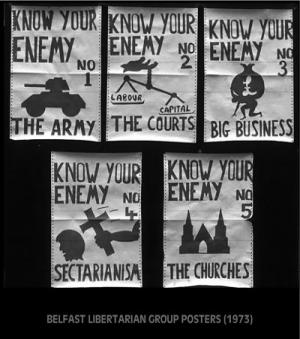 Irish anarchism is a relatively new movement. We do not yet enjoy the popular understanding of anarchist ideas that can be found among thousands of militants and the wider working class in countries like Spain and Italy and across Latin America. However, this is slowly changing, partly as we begin to uncover forgotten events. This pamphlet provides a small glimpse of the history of Belfast anarchism, an idea that continues to grow, spreading the message of radical working class direct action on the streets of Belfast.
Irish anarchism is a relatively new movement. We do not yet enjoy the popular understanding of anarchist ideas that can be found among thousands of militants and the wider working class in countries like Spain and Italy and across Latin America. However, this is slowly changing, partly as we begin to uncover forgotten events. This pamphlet provides a small glimpse of the history of Belfast anarchism, an idea that continues to grow, spreading the message of radical working class direct action on the streets of Belfast.
Revolution & Counter Revolution in Barcelona
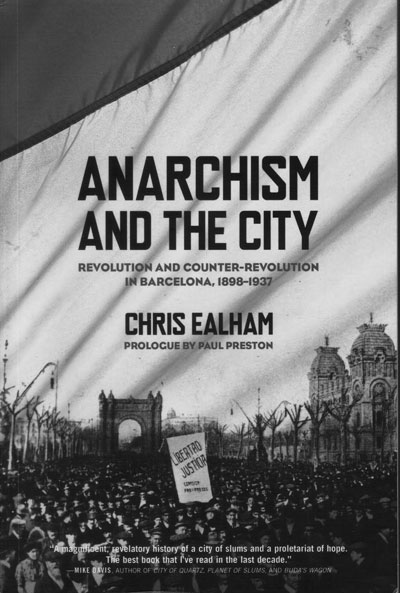 Seventy-five years ago, in Barcelona and across much of the rest of Spain, anarchists and other radical workers, in order to stop Franco’s attempted coup, stormed army barracks, took over the factories and kicked off “the greatest revolutionary festival in the history of contemporary Europe.”(p.173). A familiar story no doubt, however, unlike many ostensible working class histories of the period, that are often just histories of workers’ organisations, Ealham’s engaging writing and theoretical fluency give us a complete view of proletarian life, from community centres in the city’s slums, to unemployed groups of shoplifters, to general strikes and uprisings.
Seventy-five years ago, in Barcelona and across much of the rest of Spain, anarchists and other radical workers, in order to stop Franco’s attempted coup, stormed army barracks, took over the factories and kicked off “the greatest revolutionary festival in the history of contemporary Europe.”(p.173). A familiar story no doubt, however, unlike many ostensible working class histories of the period, that are often just histories of workers’ organisations, Ealham’s engaging writing and theoretical fluency give us a complete view of proletarian life, from community centres in the city’s slums, to unemployed groups of shoplifters, to general strikes and uprisings.
Review: Zapatista Spring
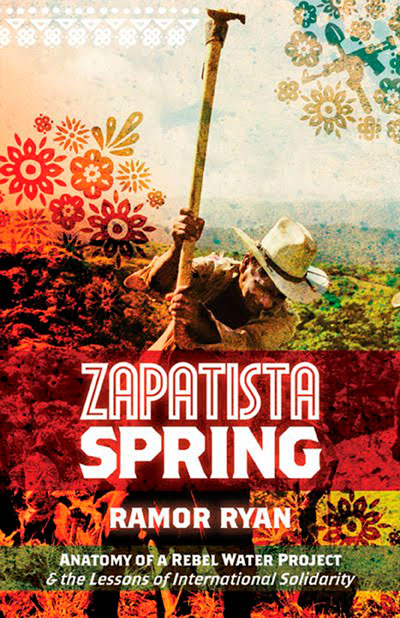 Editors’ Note: In this issue of the IAR we have the all too rare pleasure of reviewing a book by a fellow Irish anarchist. It’s Ramor Ryan’s Zapatista Spring, one of the most honest books yet published about the Zapatistas.
Editors’ Note: In this issue of the IAR we have the all too rare pleasure of reviewing a book by a fellow Irish anarchist. It’s Ramor Ryan’s Zapatista Spring, one of the most honest books yet published about the Zapatistas.
The History of Belfast anarchism
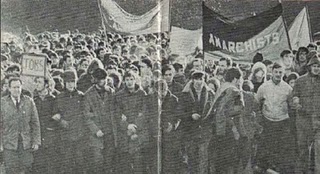
Historian Mairtin O Cathain’s ‘Wee Black Booke’ has now been added to our archive for you to read or download. In it he pulls together reports of anarchism in and around Belfast in the years from 1867 to 1973. With no local movement for much of this period, the pamphlet looks at some individuals whose political activity merited mention in the media of the time. O Cathain’s work stops before the emergence in the late 1970s of the groups from which contemporary anarchist organisations Workers Solidarity Movement and Organise! can trace their roots.
Review: Dublin Anarchist Bookfair 2011
.jpg) Wind and rain, a city in lockdown due to the upcoming royal visit and the best efforts of An Garda Siochana (who, despite the WSM gaining the correct permit to advertise the event on lamp-posts around Dublin, removed approximately 100 of our posters), the sixth annual Dublin Anarchist Bookfair continued the trend set by its predecessors in being one of the largest annual events on the calendar of Dublin’s Left.
Wind and rain, a city in lockdown due to the upcoming royal visit and the best efforts of An Garda Siochana (who, despite the WSM gaining the correct permit to advertise the event on lamp-posts around Dublin, removed approximately 100 of our posters), the sixth annual Dublin Anarchist Bookfair continued the trend set by its predecessors in being one of the largest annual events on the calendar of Dublin’s Left.
Real Democracy - The Art of Seeing
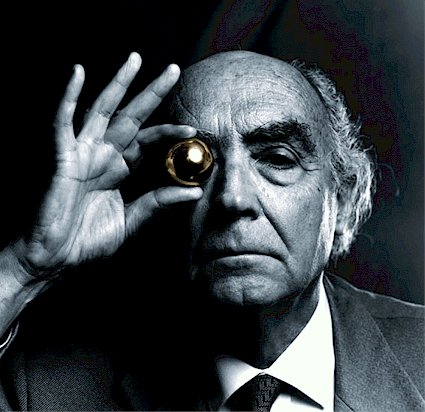
In this article, I look at how a nobel prize winning author's, José Saramago's ideas are reflected in the Real Democracy Movements goals.
When the old man picked up the Nobel Prize for literature in 1998, he referred to himself in the third person as ‘The apprentice’.
“The apprentice thought, 'we are blind', and he sat down and wrote Blindness to remind those who might read it that we pervert reason when we humiliate life, that human dignity is insulted every day by the powerful of our world, that the universal lie has replaced the plural truths, that man stopped respecting himself when he lost the respect due to his fellow-creatures.”
The 'Friends of Durruti' and the 'People's friend' part 2
WAR AND REVOLUTION
In the first issue, there is an article on page 4 with the very title "war and revolution". Here are the main passages.
The 'Friends of Durruti' and the 'People's friend' - part 1
WHO WERE THE FRIENDS OF DURRUTI
We saw, in part one, that opposition began to show itself against the lawyers who were, to a greater or lesser extent, accustomed to ministerial collaboration. Notably the Catalan Libertarian youth had declared their refusal to "become accomplices by staying silent" and they had even added "we are ready to return to illegal existence if necessary..."

